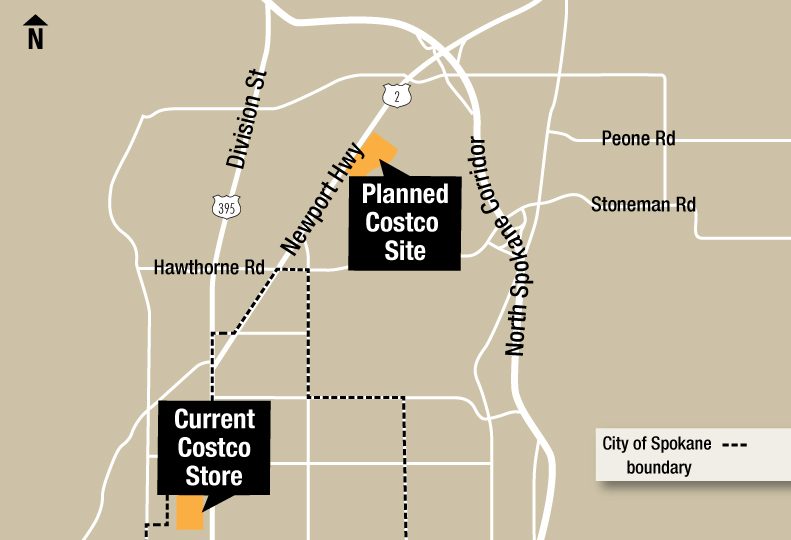
Home » Costco, county to negotiate tax-increment agreement
Costco, county to negotiate tax-increment agreement
Warehouse retailer to use development incentive

January 28, 2016
Spokane County and Costco Wholesale Corp. are etching the final strokes on an agreement in which Costco would take on the financial risk for developing infrastructure that would serve land within a tax-increment financing district that surrounds a planned new Costco store site, says Roy Koegen, a Spokane attorney familiar with the agreement.
“We’ve been working on a development agreement,” says Koegen, a partner at the Spokane office of Omaha, Neb.-based Kutak Rock LLP who’s representing the county in regard to tax-increment financing. “It’s not executed by the county or Costco yet. It’s down to little terms that Costco needs to clear internally.”
As the Journal recently reported, Costco plans to build a new store and move its north Spokane operations to a 15-acre site at 11700 N. Newport Highway, in unincorporated Spokane County, more than a mile north of the city’s northernmost border.
A representative at Issaquah, Wash.-based Costco declines to comment on the planned move.
Under the tax-increment financing agreement, Costco would buy bonds to finance up to $30 million for streets, curbs, gutters, water and sewer system extensions, and traffic signalization, Koegen says.
The bonds would be backed by anticipated increases in property tax revenue and refunded to Costco, likely over a 10-year period, he says.
If the tax revenue growth doesn’t occur, however, the county could cancel the bond, meaning the county wouldn’t be liable for infrastructure costs incurred by Costco, Koegen says.
“From a county’s standpoint, it’s conservatively aggressive,” he says. “The county wants to assist in thoughtful development, but it doesn’t want to put its checkbook at risk.”
The infrastructure would serve all of the land within the tax increment financing district, which envelops 433-acres of land owned by Foothill Ranch, Calif.-based Kaiser Aluminum Investments Co.
“The expectation is that Costco will be the anchor business that will attract other businesses,” he says.
Koegen estimates construction could start as early as midsummer. “It depends on when Costco can finalize what it wants to do,” he says.
Costco potentially could move much more quickly on the infrastructure improvements than the county could on its own, Koegen says.
“Costco can hire its own firm to meet county standards immediately,” he says.
While infrastructure would serve land development beyond the development site, Koegen says he believes Costco is only buying its planned store site.
“I don’t know what Kaiser is doing with the rest,” he says. “I’m sure Kaiser has plans to get rid of it or develop it.”
Costco’s preliminary site plans show a road proposed along the south border of the Costco site that would connect to Newport Highway at a signalized junction. That road also would intersect with another proposed interior road on the east edge of the Costco site.
Costco would manage infrastructure construction, but the company would have to follow bidding procedures required of public works projects in regard to selecting a contractor, Koegen says.
“All administrative risks, plan preparing, and bidding out will be done by Costco following public works laws and prevailing wages.” he says.
Koegen says Spokane County is a pioneer in Washington state in the formation of tax-increment financing districts.
“We did the first tax-increment project in the state here in Spokane County,” he says.
The county currently has four active tax-increment financing districts.
“In each project, the risk was shifted to the developer,” Koegen says. “It encourages good development while making sure the public coffers aren’t exposed.”
Latest News Government Retail
Related Articles
Related Products
Related Events


![Brad head shot[1] web](https://www.spokanejournal.com/ext/resources/2025/03/10/thumb/Brad-Head-Shot[1]_web.jpg?1741642753)

